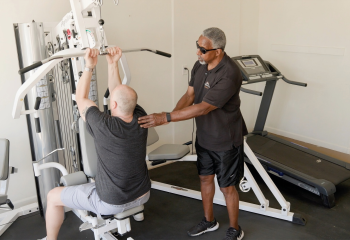More About Rehabs with Nutrition Counseling
Drug and alcohol misuse and addiction can cause nutritional deficiencies and issues with digestion. Users often have depleted levels of vitamins, minerals, and essential amino acids and fats, which can lead to a number of mental and physical problems.
How Addiction Affects Appetite
Substance misuse can have many long-term effects on health and nutrition. Substances vary in their effects, but many of them disrupt physiological functioning and impair the body’s ability to receive proper nourishment. Below are some of the many ways that drugs and alcohol can interfere with nutrition and diet:
- Failing to eat: Users may have a suppressed appetite or forget to eat while under the influence.
- Eating poorly: Those who are addicted to drugs or alcohol tend to prioritize their substance misuse over eating properly. As a result, their diets can be poor and lack sustenance.
- Malnourishment: Malnourishment can result from failing to eat consistently over time or from the body’s inability to absorb nutrients necessary for biological processes.
- Overeating: Eating too much can lead to obesity and a number of health conditions associated with excess body fat.
- Gastrointestinal disorders: Alcohol can contribute to chronic gastrointestinal tract inflammation, irritable bowel syndrome, leaky gut syndrome, pathogenic bacterial overgrowth, fungal intestinal infections, and acid reflux(1).
- Hypoglycemia: Low blood sugar can be caused by a lack of sustenance or proper diet (1).
Alcohol
Chronic alcohol misuse can significantly harm the pancreas and the liver. The pancreas helps break down food and balance blood sugar, while the liver metabolizes toxins like drugs and alcohol(2). Damage to these two vital organs can lead to an imbalance of electrolytes, protein, calories, and fluids(2). Persistent alcohol misuse can cause severe nutritional and vitamin deficiencies (e.g., folic acid, vitamin B6, and thiamine deficiencies), which can cause further health problems.
Opiates/Opioids
For many addicted to opioids, nutrition can become difficult to maintain, particularly when in the process of withdrawal. Symptoms of opioid withdrawal, such as vomiting and diarrhea, which can deplete the body of nutrients, cause electrolyte imbalances, and lead to dehydration(2). It can also be difficult to eat during this time due to gastrointestinal upset, further impacting one’s overall nutrition(2).
Stimulants
Satiety centers within the brain are influenced by the activity of stimulant drugs such as cocaine and amphetamine. Through mechanisms not altogether well-understood, their presence in the brain can send signals that turn down the overall drive to eat.
This may lead to dehydration and electrolyte imbalances due to a significant decrease in appetite and inattention to nutrition. Consistent, long-term use can lead to severe weight loss and malnutrition, along with other health problems including a suppressed immune system, changes in heart rhythm, and muscle wasting(3*).
Conversely, when people who misuse stimulants stop, their appetites may spike. They may feel compelled to overeat, which can shock the digestive system and create further problems.
Marijuana
Marijuana can increase a user’s appetite, particularly for junk food, which doesn’t contain essential vitamins and nutrients. Those who use marijuana and binge on junk food consume more trans fats than recommended, which, along with THC (tetrahydrocannabinol), impairs a cell membrane’s ability to work properly and repair damage(1). Further, the overconsumption of unhealthy food can lead to obesity and increase the risk of conditions such as heart disease, high blood pressure, cancer, sleep apnea, and reproductive problems(4*).
How Nutrition Helps With Recovery
Long-term substance misuse puts remarkable stress on the mind and body. Proper nutrition can help both the brain and the body heal from chronic substance misuse and increase the user’s odds of getting and staying sober. Some of the benefits of a implementing a healthy, balanced diet in addiction recovery can include(2):
- Repair of damage to organs and tissues.
- Improved immune defenses.
- Increased energy.
- Improved mood.
- Reduced risk of relapse due to fatigue or depressed mood.
You may be tempted to indulge in junk food while you’re recovering from addiction. But this can actually hinder your recovery process and make it more difficult for you to stay clean. The best option is to eat a nutritious diet that will foster physical and mental health and improve your chances for long-term sobriety.
Nutrition in Addiction Treatment Programs
Mental health professionals have found that recovering users maintain sobriety for longer periods of time and recover more quickly when provided with a nutrition program(1). As a result, some recovery programs offer nutritional counseling and education as a part of a comprehensive treatment plan.
Typically, a person must complete detoxification before they’re ready for nutritional therapy. Withdrawal symptoms can be uncomfortable and painful. Depending on the drug, the person can be treated with medication to ease these symptoms.
Developing a Nutrition and Diet Plan
Once the person goes through detox and is stable, a nutritional counselor will evaluate them for any nutritional deficiencies and devise a program to meet their dietary needs. The plan will likely include well-balanced meals that provide quality fats, complex carbs, and proteins(1).
The person may also receive healthy snacks throughout the day, particularly early on in recovery(1). Another important aspect of health and nutrition is exercise. Many treatment centers employ recreational therapists or personal trainers who work directly with the people in the program to improve fitness levels and promote wellbeing and positive body image.
Other recovery programs have gyms and fitness centers that can be used at designated times. Both regular exercise and a healthy diet can improve mood, increase energy levels, promote self-confidence and self-esteem, repair tissue and organ damage, and alleviate drug or alcohol cravings.
Diagnosing and Treating Eating Disorders
Substance use disorders often co-occur with other mental and behavioral health issues, including eating disorders. Dual diagnosis treatment centers can diagnose and treat both the eating disorder and the substance use disorder with integrated programs.
- Anorexia nervosa, which is characterized by a preoccupation with weight and severe caloric restriction, can lead to malnourishment and life-threatening weight loss(5). Someone suffering from this eating disorder and an addiction to drugs or alcohol should receive proper nutritional care to restore his or her body back to a normal weight and to regain physical health.
- Bulimia nervosa is characterized by eating large amounts of food then purging by vomiting, using laxatives, or exercising excessively(5). All of the possible complications of this type of eating disorder must be evaluated for and addressed when creating a nutritional plan for someone with this eating disorder.
- Binge eating disorder is characterized by the person repeatedly binging food but not compensating with any weight loss methods(5). A nutritional counselor will likely begin a well-balanced diet and exercise program to promote healthy body weight.
Find a Nutrition and Addiction Rehab Center
If you or a loved one is struggling with malnutrition as a result of addiction, it’s important to remember that you are not alone. There are numerous treatment centers available that offer treatment for those struggling with addiction and malnutrition. Whether in an inpatient or outpatient program, evidence-based addiction treatment can lead to positive health outcomes. If you’re ready to start searching for rehab, consider visiting the Recovery.com treatment directory. Our powerful online resource can help you search nationwide for suitable rehab centers.
Sources
- Miller, R. P. (2010). Nutrition in Addiction Recovery. Many Hands Sustainability Center.
- National Library of Medicine.(2014). Diet and substance use recovery: MedlinePlus Medical Encyclopedia.
- Nutrition Support for Adults: Oral Nutrition Support, Enteral Tube Feeding and Parenteral Nutrition (Vol. 32). (2006). National Collaborating Centre for Acute Care (UK).
- National Heart, Lung, and Blood Institute. (2012). What Are the Health Risks of Overweight and Obesity?
- Grilo, C. et al. (2002). Eating Disorders and Alcohol Use Disorders. National Institute on Alcohol Abuse and Alcoholism.



































































































































